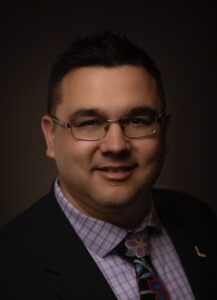Eshkawkogan featured in Top 100 Magazine of country’s business professionals

By Sam Laskaris
LITTLE CURRENT – Kevin Eshkawkogan had a simple request when he was approached to be featured in a prestigious magazine.
Eshkawkogan, the president and CEO of Indigenous Tourism Ontario (ITO), was asked to be in an issue of The Top 100 Magazine. The issue focusses on the Top 100 Canadian business professionals.
“They reached out to me,” said Eshkawkogan, a member of M’Chigeeng First Nation who lives in Little Current on Manitoulin Island. “They saw my name coming up in multiple places.”
Though flattered by the interest, Eshkawkogan stressed he was not interested in an article strictly about him. He wanted the focus to be on the ITO.
“They wanted to do the story on me, just as an individual,” he said. “But the work I do is not for my well-being, it’s for the community good. I didn’t think it should just be a celebration of the work I do. It’s a celebration of the Indigenous tourism work we do.”
Besides being a member of M’Chigeeng First Nation, Eshkawkogan also has plenty of connections with a pair of other First Nations on Manitoulin Island.
His mother is from the Aundeck Omni Kaning First Nation, which is also where his current business office is located. And his father is from Wiikwemkoong Unceded Territory, while his stepfather is a M’Chigeeng First Nation member.
As of this year, the ITO had more than 550 Indigenous tourism business members. The association also has about 300 members that represent non-Indigenous tourism businesses.
Eshkawkogan admits the coronavirus disease 2019 (COVID-19) pandemic has been a tremendous blow to many ITO members this year.
Restrictions forced many of those businesses to close their doors for months. And even many of those that have been able to recently open up again are facing significant losses and financial difficulties.
“Businesses are still closing, basically daily,” Eshkawkogan said. “We’re crossing our fingers some of these will be temporary.”
Indigenous tourism businesses in Ontario cover many sectors, including restaurants and businesses offering cultural experiences, camping, hotels, lodges and tours.
Eshkawkogan believes there is and will continue to be a great need for Indigenous tourism businesses in the province. And he’s confident that one day, the industry will once again be a booming one.
“Indigenous people are very resilient people,” he said. “And Indigenous tourism businesses are resilient. We’ve got a great recipe to come back even stronger.”
As an example, Eshkawkogan mentioned Anishinaabe/Algonquin chef Johl Whiteduck Ringuette, who closed his popular NishDish restaurant in Toronto recently.
“He’s very much a forward-thinker,” Eshkawkogan said. “I know they’re going to come back.”
Eshkawkogan realizes, however, it is going to take some time for the Indigenous tourism industry to recover in the province.
ITO has created a five-year strategic and COVID-19 recovery plan.
“We will be back, stronger than ever,” he said.
Eshkawkogan added the ITO officials have realized since March how much of an impact the pandemic will have on the Indigenous tourism industry in the province.
The ITO released information on the potential economic impacts the pandemic would have in both March and April. And ITO released its recovery plan in June.
“We’re proud of the work we do with Indigenous tourism businesses in Ontario,” he said.
Eshkawkogan is also heavily involved in hockey. He is currently the District 7 council director for the Northern Ontario Hockey Association.

